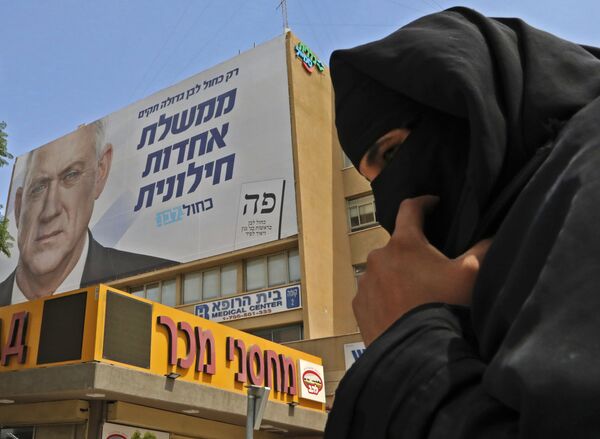Sputnik: The Blue and White Alliance is considered a formidable challenger to Netanyahu's Likud, each won 35 seats in the 120-seat Knesset in the April election. Is there a possibility that the results of the April election could be repeated?
Izhar Shay: Indeed, the way the Israeli political system works is that parties have to join forces together in order to put together a coalition of more than 60 parliament members, who will then construct a new government. One of the possibilities is Kahol Lavan and the Likud parties joining forces together and that will help enough to a long time of campaigning against each other within the political race towards winning the upcoming elections. I’m optimistic - I believe that the new government will come together, which will be best on the policies that the Blue and White are pushing forward - our fundamentals are liberal, democratic government which will be based on a wide support of a number of parties. I believe that both Likud and Kahol Lavan will be able to put behind us the tensions that manifested themselves at times during the recent campaign - it is the interests of the country, the interests of the nation, the interests of the Israeli citizens, to see all of this behind us and us, the politicians, looking forward towards working together, putting things to rest, bringing some calm and rest into the political system and stabilising the government which will have the best interests of everybody in this country at heart.
Sputnik: Democratic Union co-chairman Nitzan Horowitz has accused Blue and White leader Benny Gantz of seeking to form a government with the Likud rather than replacing that party and forming a centre-left coalition. How viable are these claims?
Izhar Shay: After winning the upcoming election on 17 September, we do see a number of alternatives in forming a new government here in Israel. One of those alternatives will indeed be approaching the Likud party post the Netanyahu era and suggesting the Likud party to join us, at the Blue and White, in forming what we call here in Israel "a wide stable government". This is indeed a realistic and desirable choice, but other than that there’ll be additional alternatives - our approach will be to seek cooperation with parties that will be agreeable upon aligning with our policies, of creating a democratic, liberal government here in Israel. And for that purpose, we believe that a number of parties may sign up to our programme, to our platform, to our new liberal government - and one of those parties may indeed be the Likud.
Sputnik: How do you assess the possibility of Likud and Kahol Lavan having to govern together, after seven months of campaigning against each other? What kind of government could be formed this September, if any?
Izhar Shay: Yes, indeed the Blue and White alliance has been the most significant contender on the Likud party’s dominance over Israeli politics in recent years. This is the reason why we have created a very intensive and hopefully a clever campaign that will be able to overcome this dominance. There’s indeed a possibility that the results of the April elections will be repeated - although we’re hoping for better results. The Israeli voters need to see the alternative - Israel as a country needs to overcome this long period of political chaos and uncertainty as to the appropriate structure of the next government. We hope that after 17 September we will see a government formed by Blue and White, which will be a stable government and will be a change to the current administration’s policies and attitudes towards significant parts of the Israeli public.
Sputnik: Many analysts say Avigdor Lieberman is the likely beneficiary of the second election. Do you agree with this claim?
Izhar Shay: Well, on the one hand, Mr Lieberman is indeed the one politician that could claim credit for the fact that Israel is going into elections again on 17 September. On the other hand, I’m not sure if he could call himself the beneficiary of the second elections - it really depends on how the voters will vote on election day, on the result of the elections and on the political map that will turn out of this elections. If Mr Lieberman becomes a must-have factor in a new government, then he could definitely be the beneficiary in the elections. Nevertheless, Israeli politics have proved to be tricky a good number of times in the past - nobody knows for sure now who will be a determining factor, who will be a beneficiary and who will not be after 17 September.

Sputnik: Benny Gantz has recently appealed to Arab voters, calling them "equal and influential in every way," adding that he would work to help Israeli Arabs - rhetoric which differs from that of Likud but is not really accepted by Arab voters. What's behind this statement by Gantz?
Izhar Shay: Arabs are a significant fact of the Israeli population. They consist of about 22 percent of the Israeli population - that means that any government formed in Israel should consider seriously their interests, their needs, their challenges and also opportunities within this significant part of our democracy. That said, we are disappointed to see again, time and time again, the political leaders of the Arab population in Israel focusing more on external needs, and negative policies towards Israel, which have nothing to do with the interests of the local Arab population here in Israel. We’re hopeful that at a certain point we will see Arab leaders coming up, representing properly the actual needs of the population here - those needs are education, job creation, equal opportunities, infrastructure, planning and many more - and with those leaders we would want to form partnerships and to see them involved in government policies and in creating the appropriate opportunities to fully integrate in to democratic and liberal Israel.
Sputnik: The Blue and White party criticised Prime Minister Netanyahu's declaration that he'll apply Israeli sovereignty to the Jordan Valley and the northern Dead Sea if he is re-elected after the 17 September elections. What could the consequences of such a step on both the home and international front be?
Izhar Shay: The reason we have criticised Netanyahu’s declaration is that because he is yet again used matters of national security in a very cynical way for the political campaign. As a matter of fact, the Blue and White leaders declared about two months ago, way before Netanyahu’s statement last week, the Blue and White party leaders stated that Jordan valley will be forever in a permanent solution within the control of the Israeli army and Israel will never ever accept the presence of any kind of military forces west of Jordan valley. So that is not the question on our mind. What is an issue - is the Netanyahu’s announcement comes a few days before the elections in Israel, which indicates that the only reason for this announcement was to try to gain some political leverage and the attention of voters. This misuse of Israeli political interests is yet another proof of Netanyahu’s desperation and the fact that he will do everything he can do in order to win additional votes - disregarding the basic fundamentals of the Israeli policy and security needs.
Sputnik: You are not the only tech executive to join the party, with the leader of the party Benny Ganz having experience in tech himself. What is your vision for Israel’s future and start-ups in the country following the election?
Izhar Shay: We believe that the economy of innovation, which includes hi-tech, med-tech, any kind of tech and any kind of entrepreneurship and breakthrough technologies are important and critical for the state of Israel. We put together a plan based on the vision that we want to reinforce the economy of innovation as a strategic asset of the state of Israel. For that purpose, we believe that the government should continue to be creative in supporting the notion of investment in the Israel’s hi-tech, attracting foreign international companies to place here some of the facilities to create a significant synergy between the Israel academy and many entrepreneurs, who want to build companies based on those breakthrough technologies and the whole ecosystem that would be supportive and create many more new startup companies. It is part of our policy - to determine that the economy of innovation is a strategic national goal and we’re going to do whatever is possible within our control to continue to build up and support this very important economy to the state of Israel.

Sputnik: Prime Minister Netanyahu is to visit Putin prior to the Israeli elections, how significant is this visit? What impact can it have on Netanyahu’s poll results?
Izhar Shay: The relationship between Russia and Israel is obviously a critical factor for the Israeli government. Russia being an international superpower means that any government formed in Israel and any PM will seek close intimate and productive relations with the Russian administration. We do have ongoing dialogues with Russia as they relate to Syria, to the situation in the Middle East and along with that also technological, commercial and economic cooperation that hopefully will lead to even strengthening the relationships in the upcoming future. All is said, it is safe to assume that any PM in Israel will seek close relationships with president Putin, based on the recognition of mutual interests and looking forward to strengthening those relationships. However, the recent frequent travel arrangements of Netanyahu - not only to Russia but also to the UK, Ukraine and elsewhere - all of these travel arrangements cannot leave aside ones question marks about how important they are, how critical they are, and how closely relayed they are to a political campaign that is taking place right now - and not necessarily to the actual interests of the state of Israel.

